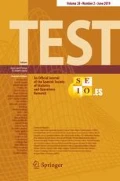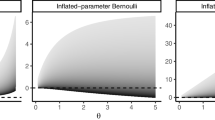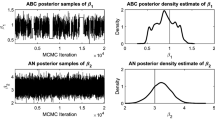Abstract
The stable tail dependence function gives a full characterisation of the extremal dependence between two or more random variables. In this paper, we propose an estimator for this function which is robust against outliers in the sample. The estimator is derived from a bivariate second-order tail model together with a proper transformation of the bivariate observations, and its asymptotic properties are studied under some suitable regularity conditions. Our estimation procedure depends on two parameters: \(\alpha \), which controls the trade-off between efficiency and robustness of the estimator, and a second-order parameter \(\tau \), which can be replaced by a fixed value or by an estimate. In case where \(\tau \) has been replaced by the true value or by an external consistent estimator, our robust estimator is asymptotically unbiased, whereas in case where \(\tau \) is mis-specified, one loses this property, but still our estimator performs quite well with respect to bias. The finite sample performance of our robust and bias-corrected estimator of the stable tail dependence function is examined on a simulation study involving uncontaminated and contaminated samples. In particular, its behavior is illustrated for different values of the pair \((\alpha , \tau )\) and is compared with alternative estimators from the extreme value literature.





Similar content being viewed by others
References
Abdous B, Ghoudi K (2005) Non-parametric estimators of multivariate extreme dependence functions. J Nonparametr Stat 17:915–935
Basu A, Harris IR, Hjort NL, Jones MC (1998) Robust and efficient estimation by minimizing a density power divergence. Biometrika 85:549–559
Beirlant J, Dierckx G, Goegebeur Y, Matthys G (1999) Tail index estimation and an exponential regression model. Extremes 2:177–200
Beirlant J, Dierckx G, Guillou A (2011) Bias-reduced estimators for bivariate tail modelling. Insur Math Econ 49:18–26
Beirlant J, Escobar-Bach M, Goegebeur Y, Guillou A (2016) Bias-corrected estimation of stable tail dependence function. J Multivar Anal 143:453–466
Beirlant J, Goegebeur Y, Segers J, Teugels J (2004) Statistics of extremes–theory and applications. Wiley, New York
Beirlant J, Joossens E, Segers J (2009) Second-order refined peaks-over-threshold modelling for heavy-tailed distributions. J Stat Plan Inference 139:2800–2815
Beirlant J, Vandewalle B (2002) Some comments on the estimation of a dependence index in bivariate extreme value statistics. Stat Probab Lett 60:265–278
Bücher A, Dette H, Volgushev S (2011) New estimators of the Pickands dependence function and a test for extreme-value dependence. Ann Stat 39:1963–2006
Capéraà P, Fougères A-L (2000) Estimation of a bivariate extreme value distribution. Extremes 3:311–329
Dierckx G, Goegebeur Y, Guillou A (2013) An asymptotically unbiased minimum density power divergence estimator for the Pareto-tail index. J Multivar Anal 121:70–86
Draisma G, Drees H, Ferreira A, de Haan L (2004) Bivariate tail estimation: dependence in asymptotic independence. Bernoulli 10:251–280
Drees H, Huang X (1998) Best attainable rates of convergence for estimators of the stable tail dependence function. J Multivar Anal 64:25–47
Dutang C, Goegebeur Y, Guillou A (2014) Robust and bias-corrected estimation of the coefficient of tail dependence. Insur Math Econ 57:46–57
Einmahl JHJ, de Haan L, Sinha AK (1997) Estimating the spectral measure of an extreme value distribution. Stoch Proc Appl 70:143–171
Feuerverger A, Hall P (1999) Estimating a tail exponent by modelling departure from a Pareto distribution. Ann Stat 27:760–781
Fougères AL, de Haan L, Mercadier C (2015) Bias correction in multivariate extremes. Ann Stat 43:903–934
Goegebeur Y, Guillou A (2013) Asymptotically unbiased estimation of the coefficient of tail dependence. Scand J Stat 40:174–189
Gomes MI, de Haan L, Rodrigues LH (2008) Tail index estimation for heavy-tailed models: accommodation of bias in weighted log-excesses. J R Stat Soc B 70:31–52
Gomes MI, Martins MG (2002) “Asymptotically unbiased” estimators of the tail index based on external estimation of the second order parameter. Extremes 5:5–31
de Haan L, Ferreira A (2006) Extreme value theory–an introduction. Springer, New York
Huang X (1992) Statistics of bivariate extremes. PhD Thesis, Erasmus University Rotterdam, Tinbergen Institute Research series No. 22
Ledford AW, Tawn JA (1996) Statistics for near independence in multivariate extreme values. Biometrika 83:169–187
Ledford AW, Tawn JA (1997) Modelling dependence within joint tail regions. J R Stat Soc B 59:475–499
Peng L (2010) A practical way for estimating tail dependence functions. Stat Sin 20:365–378
Pickands J (1981) Multivariate extreme value distributions. B Int Stat Inst 49:859–878
Qi Y (1997) Almost sure convergence of the stable tail empirical dependence function in multivariate extreme statistics. Acta Math Appl Sin-E 13:167–175
Schmidt R, Stadtmüller U (2006) Non-parametric estimation of tail dependence. Scand J Stat 33:307–335
Acknowledgements
The authors thank the associate editor and the reviewers for their helpful comments which led to improvements of their paper.
Author information
Authors and Affiliations
Corresponding author
Additional information
This work was supported by a research Grant (VKR023480) from VILLUM FONDEN and an international project for scientific cooperation (PICS-6416).
Electronic supplementary material
Below is the link to the electronic supplementary material.
Rights and permissions
About this article
Cite this article
Escobar-Bach, M., Goegebeur, Y., Guillou, A. et al. Bias-corrected and robust estimation of the bivariate stable tail dependence function. TEST 26, 284–307 (2017). https://doi.org/10.1007/s11749-016-0511-5
Received:
Accepted:
Published:
Issue Date:
DOI: https://doi.org/10.1007/s11749-016-0511-5




